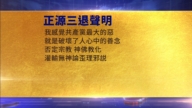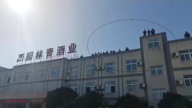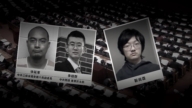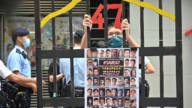【新唐人2012年3月23日訊】薄熙來被免職引發的京城政變傳言越演越烈,由於當局封殺言論,加強網控,在真假難辯,真相難明的情況下,網友紛紛用各種令人啼笑皆非的暗語,解說中南海混戰,影射周永康政變未成,反遭胡溫清除的小道消息。
19號夜間大陸微博傳出「西紅柿被雙規」、「紫禁城槍聲」、「機場封鎖」、「長安街戒嚴」等訊息,20號凌晨更有人傳說,一支部隊開進北京,胡溫和江系已經相互抓捕對方人馬,中南海內部混亂,頓時一片政治烏雲籠罩北京。
當晚,網絡空間幾乎通宵達旦等待內情曝光,網友在等待中頂帖、跟帖時也發現,不斷有刪帖、封帖現象出現,「長安街」、「槍聲」等也變成了敏感詞。網民開始變通發帖方式,改用暗語,如:「第十八屆拔河預選賽,由胡蘿蔔小丸子帶隊,天線寶寶,小霸王學習機,木子李為隊員的龍隊大獲全勝。對手康師傅牛腩麵由於臨陣缺少西紅柿,慘重失敗。」
然而傳言並沒有到此停止,20號晚一條「天線寶寶大戰康師傅」帖子紅遍網絡,另有帖子說,參加「大戰」的還有「胡一刀」、「江小魚」等人,而康師傅一派因戰前損失大將「西紅柿」最終敗北,導致康師傅下架。
21號,網絡再傳用暗語詳述中共內鬥故事的完整版資料。北京一位長期研究官場的人士分析,這份資料的可信度比較高。
這些暗語的大意是,周永康因不滿胡溫雙規薄熙來,發生內鬥,絕大部分太子黨倒戈向胡溫及習近平,江系和周永康「挺薄派」在權鬥中慘敗。
網絡作家荊楚指出,薄熙來被免職,當局封鎖事件真相,刺激了民眾的探究欲望,本能的從各種管道中搜索小道消息,但卻遭當局過濾,所以他們就用暗語編段子惡搞高層。
荊楚:「這個網絡過濾,敏感詞設置,就像被人掐了脖子,很多話都不能說,這是中國特色,通常搞這一個細化中國人思想的文化方式。 網民就用這種方式躲避過濾,你像胡錦濤,有的網友就把他說成『胡緊套』,這樣就可躲過網絡過濾了。」
網絡作家昝愛宗指出,網民用暗語躲避當局網絡過濾,在大陸已經持續了十幾年,當局一直設置新的敏感詞,網友也一直在發明新的替代詞,像火星文、豎排版,都是網民為了防範過濾詞而研發的。
昝愛宗:「這個現象就說明中國還沒真正的開放,你開放不僅僅是經濟上的開放,還要有政治上的開放,言論自由這方面的開放,你有了開放才能有對這個國家有建設性的語言,有正常的評價,有正常的批評,這個社會才正常。」
昝愛宗還指出,中國離現代化國家管理的道路還很遙遠,很多事情只能靠猜,也是導致網民發明替代詞,影射諷刺高層的原因之一。
採訪編輯/李韻 後製/孫寧
———————
Chinese Netizens Use Code Words to Discuss CCP Insider Struggles
The rumor mill is that the removal of Bo Xilai from his post
has led to a coup in Beijing.
Since the authority tightened control over freedom of speech,
especially on the Internet, it has become very hard to confirm the truth.
Under such conditions, Chinese netizens have implemented
various code words to talk about the CCP entanglement.
One unconfirmed story from some sources goes that
Zhou Yongkang, who was deprived of power by Hu and Wen, (President and Premier) failed in the coup.
Starting on the evening of March 19th, messages with the
phrases ‘“Tomato” was detained for interrogation,”
“Forbidden City gunshots,” “Airports are closed,” and
“Chang’an Avenue martial law” appeared on Chinese microblog websites.
On the morning of March 20th, it was even said that
troops had entered Beijing.
Rumors point to the Hu and Wen (the current President
and his Premier) faction, along with the Jiang (former
President), faction, arresting each other’s group members,
plus turbulence at Zhongnanhai (CCP central headquarters).
Sudden political changes caused a gathering of clouds
over Beijing.
On the evening of the same day, many netizens stayed online
through the night waiting for updates about the situation.
They found many posts to be deleted during that time and
words such as “Chang’An Avenue” and “gunshots” became censored.
Reacting to such changes, netizens began to use code words
and phrases in their posts, such as
“in the 18th tugging war contest” (18th National Congress),
the “carrot ball” (Hu Jintao) led his team members “antenna baby” (Wen Jiabao),
“learning machine” (Xi Jinping), and “wood seed” (Li Keqiang)
to win against their rivals “Master Kong beef noodle” (Zhou Yongkang),
who severely lost the game without support
from “Tomato” (Bo Xilai).
The rumors didn’t stop there.
Another online post titled “’Antenna baby fights against
Master Kang” became popular starting on the night of Mar 20th.
Another post told a similar story of “Hu Yidao” (Hu Jintao)
and “Jiang Xiaoyu” (Jiang Zemin) joining the fight, and
due to the loss of their key member “Tomato” (Bo Xilai),
the “Master Kang noodles” (Zhou Yongkang’s group) were finally defeated and driven off of the shelf (lost power).
On March 21st, a more complete online report regarding
the CCP insider struggles was written in code words.
According to a senior political analyst in Beijing,
some contents in this report are quite reliable.
After translation, this “code word story” said that
Zhou Yongkang was angry about Hu and Wen’s detainment
and interrogation of Bo Xilai, so consequently started
an internal conflict.
With most princelings choosing to support Hu-Wen and
Xi Jinping, the Zhou-Jiang faction was dealt a crushing defeat.
Internet writer Jing Chu pointed out that the truth of Bo Xilai’s
dismissal being blocked by the authority has aroused the Chinese people’s inquiring minds.
They attempt to collect information by all means,
nevertheless suffer intensified censorship.
Under such suppression, they began to create code words
to jokingly refer to the CCP leaders.
(Jing Chu): ”The censorship of “sensitive words” on the web
makes you feel like (you’re) being stretched from the neck and unable to say a lot of things.
This characteristic of the CCP aims at regulating the opinions
of Chinese people in a cultural form.
In response, the Chinese netizens create code words
to bypass the filter.
For example, some netizens refer to Hu Jintao as “Hu tightening
cover,” which has a similar pronunciation in Chinese so it may survive the Internet censorship.
Internet writer Zan Aizong remarked that it has been more
than one decade since Chinese netizens began to use code words against censorship.
The authority continuously adds new words to the filter list,
and netizens are continuously creating new code words as well.
They also invented mars letters and use column writing
to get the same results.
(Zan Aizong): ”Such a phenomenon proves that China
is not truly open.
The openness is not for economy only, but also
in politics and speech.
Only with such freedom can constructive suggestions
be accepted, can the critics’ remarks be presented, and can the whole society function normally.”
Zan Aizong further remarked that currently China is still far
from a modernized management.
With the truth being blocked, speculation happens often,
which is also one driving force of using sarcastic code words to communicate about the CCP leaders.
On the other hand, such alternative words are destroying
the Chinese language.
Zan believes that once the censorship is upset, Chinese people
will finally recover their tradition of language and culture.






























